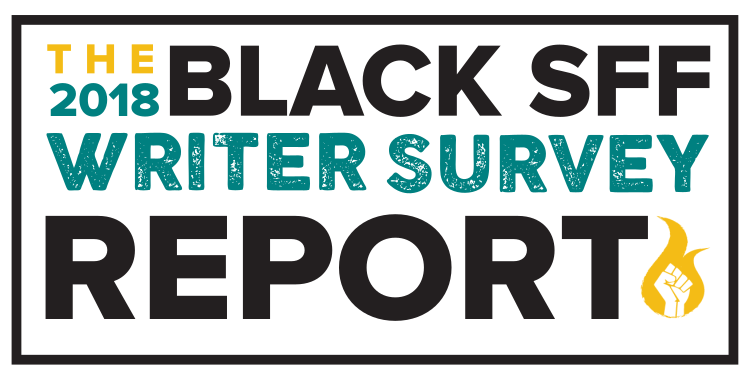
We’re back with our biannual look at responses to the Black SF Writer Survey.
As always, the FIYAH Black SFF Writer Survey Report is not a further attempt to confirm data featured in studies like the Fireside #BlackSpecFic Report, nor is it a rigorous empirical study on the state of SFF publishing in general. Instead, we encourage readers to view the FIYAH Black SFF Writer Survey Report as a contextualization tool. With this survey, we are attempting to add what is probably the most neglected–and most important–perspective to the conversation: that of Black writers themselves.
Our survey responses give us a clearer picture of who these writers are: global, writing in multiple genres, at various stages in their writing careers. In this report, we seek to collect and spotlight information and opinions of these Black speculative fiction writers. We feel that this kind of insight is invaluable for a true assessment of Black writers’ attitudes regarding their treatment by markets that publish short form speculative fiction and by publishing in general.
It is important to note that all of the writer-side data is self-reported. We invited writers to submit information about their practices and insights on submission to SFF short fiction markets with a focus on the period between October 2016 and November 2018. The iterations of the surveys are here referred to as “Study 1” for our analysis of 2016’s submissions, and “Study 2” for the current iteration, examining the combined responses from the 2017 and 2018 surveys.
The responses we received have allowed us to:
Quantify the existence of black speculative fiction writers seeking publication. When we combine the unique responses to the 2017 and 2018 surveys with with the number of writers that submitted work to FIYAH’s Magazine’s open calls, we can reasonably confirm the existence of at least 178 individual Black SFF prose writers who have submitted short fiction to any zines within the focus period. This, of course, is not a generally reflective number of every Black person on the planet who writes speculative fiction and submits it to magazines for publication.
Provide submission context to existing publication data. Respondents were asked to identify the markets they had submitted short fiction to during the focus period. This market list was generated from the one used in Study 1 (2016), the write-in responses from that survey, and adjusted to reflect newly opened/shuttered/on hiatus. The full list of markets receiving at least one submission from our respondents can be found here.
Expose the impact of doleful publication statistics on Black writers. The report from our first study indicated that most respondents felt reading reports like Fireside’s #BlackSpecFic or the Lee and Low Diversity Baseline Survey either discouraged them from submitting work to short fiction markets or had no effect on their decision to submit work to short fiction markets.
Enable markets to pinpoint their failings in attracting or publishing Black writers. We offered respondents the opportunity to volunteer information about their thoughts on their submissions and rejections. A summary of those comments can be found here.
TL;DR: Study 2 Trends
- Study 2’s responses have indicated a shift toward a feeling of encouragement/indifference after reading market analyses, suggesting increased writer confidence that the field is at least paying attention and working to improve, and that the initial shock of these studies has abated.
- Black writers are increasingly comfortable with self-identifying as Black in submissions, regardless of if it is requested/required by a market.
- One-off anthologies have seen some of the highest submission and sales numbers from Black writers in the last two years.
Going Forward
We covered next steps pretty thoroughly in our first study, but we’ve also developed new tools and new areas of focus since then. We are pleased to see markets like Strange Horizons are trying to provide more substantive feedback in rejections. This has undoubtedly contributed to their high submission rate from Black writers, alongside their inclusive masthead, use of social media engagement to maintain an active presence with their audience, a clear and thorough diversity statement on their submissions page, and adding special issues like the SEUSA into their already inclusive publication schedule. The more markets adopt these policies, the more likely Black writers are to seek them out as places their voices are welcome.
We are also expanding our POB Scoring initiative to provide markets with a means to collect volunteered demographic data from submitting writers, thus fulfilling that particular ask in our first study’s Going Forward document.
Use the BSF Report Menu in the sidebar to navigate between report features. You can send questions to bsfreport@fiyahlitmag.com or talk to us about it on Twitter using #bsfreport.
A final note: We know that some usual suspects will attempt to invalidate what we’ve captured by claiming that our analysis lacks rigor, or our methodology was faulty. This is a smokescreen that these individuals use to hide the fact that they are against making the speculative fiction publishing space inclusive and respectful to Black writers–all writers, really–and their work. Using assumed (and faulty) scientific expertise to attack the experiences of marginalized people is not a new tactic, and one that is frequently used by these groups in an attempt to maintain the oppressive systems that they believe should solely benefit them. They will never admit that fact so we are making it plain here.
This report is not for those people.
This report is for writers, readers, editors, magazines, and fans interested in actively working against the anti-black bias inherent in this system for the sake of the writers and work that said bias excludes. The data is available for interested parties to review. The trends have already been confirmed, repeatedly. We are giving space to those most affected by this bias and these trends. We hope that you take a moment to listen to the voices collected here, and to truly reckon with what they are saying.
If you are interested in contributing to future surveys as either a writer or market, you are welcome to complete the form below and we will keep you abreast of new projects concerning the state of Black speculative fiction.

